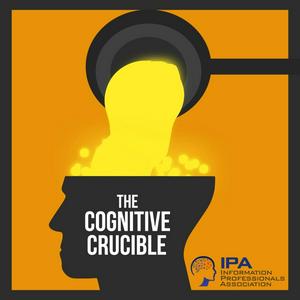The Cognitive Crucible is a forum that presents different perspectives and emerging thought leadership related to the information environment. The opinions expressed by guests are their own, and do not necessarily reflect the views of or endorsement by the Information Professionals Association. During this episode, Brian Hamel discusses his 2023 Army Command and General Staff Theses entitled: Reframing the Special Operations Forces-cyber-space triad: Special Operations' contributions to space warfare. Brian delves into the complex and evolving landscape of modern warfare, focusing on the intersection of Special Operations Forces (SOF), cyberspace, and space. The "Triad" emphasizes the synergistic relationship between these domains to achieve strategic objectives. Those interested in military strategy, national security, and the future of warfare will enjoy this one. Recording Date: 16 Dec 2024 Resources: Cognitive Crucible Podcast Episodes Mentioned #124 Dean Cheng on China, Space, and Information Operations #130 Teasel Muir-Harmony on Spaceflight, Foreign Policy, and Soft Power Command and General Staff Thesis: Reframing the Special Operations Forces-cyber-space triad: Special Operations' contributions to space warfare by Brian Hamel Army University Press Article: Reframing the Special Operations Forces-Cyber-Space Triad by Brian Hamel Supporting Warfare in the Indo-Pacific Through Space-Based Sustainment by Maj. Brian E. Hamel Bowen, Bleddyn E. War in Space: Strategy, Spacepower, Geopolitics. Edinburgh: Edinburgh University Press, 2020. Carlson, Joshua P. Spacepower Ascendant: Space Development Theory and a New Space Strategy. Independently Published, 2020. Drew, Jerry: The Battle Beyond Gallegos, Frank. “After the Gulf War: Balancing Space Power’s Development.” In Beyond the Paths of Heaven: The Emergence of Space Power Thought, edited by Bruce M. DeBlois, 63–102. Maxwell AFB, AL: Air University Press, 1999. Klein, John J. War in Space: Strategy, Spacepower, Geopolitics. New York: Routledge, 2006. Klein, John J. Understanding Space Strategy: The Art of War in Space. London: Routledge, 2019. Scramble for the Skies: The Great Power Competition to Control the Resources of Outer Space by Namrata Goswami and Peter A. Garretson Link to full show notes and resources Guest Bio: Maj. Brian E. Hamel is a space operations officer assigned to the United States Army Special Operations Command at Fort Liberty, North Carolina. He is a graduate of the School of Advanced Military Studies, the Information Advantage Scholars Program, and the Red Team Leader course. Brian has multiple rotations to the Middle East and South America with special operations units. He has a Master of Art from Northeastern University, and recently wrote a thesis detailing special operations’ contributions to space warfare as part of the Information Advantage Scholars Program at the Command and General Staff College, Kansas. About: The Information Professionals Association (IPA) is a non-profit organization dedicated to exploring the role of information activities, such as influence and cognitive security, within the national security sector and helping to bridge the divide between operations and research. Its goal is to increase interdisciplinary collaboration between scholars and practitioners and policymakers with an interest in this domain. For more information, please contact us at
[email protected]. Or, connect directly with The Cognitive Crucible podcast host, John Bicknell, on LinkedIn. Disclosure: As an Amazon Associate, 1) IPA earns from qualifying purchases, 2) IPA gets commissions for purchases made through links in this post.
